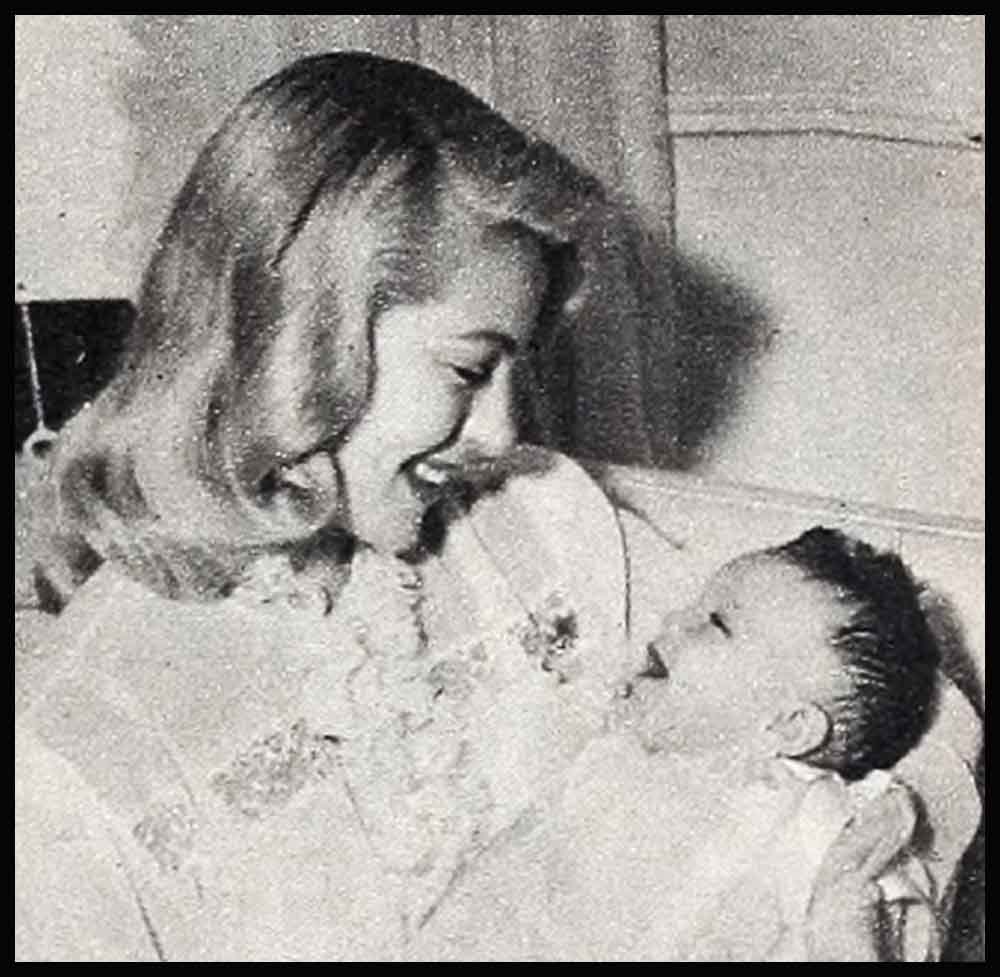
The Untold Story of Lana Turner’s Shame
“I am to blame for it all!” a sobbing Lana Turner cried over and over, after her fourteen-year-old daughter, Cheryl Crane, who confessed to stabbing Lana’s love, John Stompanato, to death with a sharp, ten-inch butcher knife, had been taken away from her to Juvenile Hall to await a hearing. “I am to blame!”
. . . Was she?
On April 11th, a week after the Good Friday tragedy, an inquest was held to establish the facts.
Cheryl Crane was excused, on the ground that she had already given a complete statement to the authorities.
Mickey Cohen, ex-racketeer pal of Johnny Stompanato, who had claimed the body and become a prominent performer in the proceedings, being the source who released Lana’s torrid love letters to Johnny to the press, promised fireworks which fizzled when he refused to identify the body, “for the reason that I may be accused of this murder.” He was quickly dismissed.
Clinton H. Anderson, Chief of Police of Los Angeles County, testified: “The first person I talked to after a briefing with officers was Miss Turner. She was quite hysterical and weeping and she said, ‘Can’t I take the blame for the horrible thing?’ I said, ‘No, unless you have committed the act and we will find out all of the facts, so you might as well start off with the premise that we are to learn all of the facts . . .’ ” He went on to recount how Lana had told him that Cheryl had rushed in to defend her when Stompanato had threatened her with bodily harm, and threatened to kill her.
That left Lana. The star witness, in a courtroom scene that for sheer tragic drama far surpassed any of the many she had played in her twenty years as a top star of the screen. Even as she played this, her greatest scene, with her daughter’s future and freedom at stake, she was being seen all over the country as the mother of a teenage daughter in “Peyton Place,” playing another courtroom scene in a role that had marked the highest peak of her career—a nomination for the Academy Award.
She faced a battery of radio and TV microphones, cameras and newsmen—and, directly opposite, sober and pale, Cheryl’s father, her second husband, Stephen Crane. She began to speak in a clear, though halting voice. But as the sixty-two minute ordeal went on, tears coursed down her grief-stricken face unrestrained. Her dainty white handkerchief was soon soaked, and she sat, twisting it helplessly in her hands. When she came to the moment of the fatal stabbing she almost collapsed, then rallied.
The next day, newspapers from coast to coast carried full accounts of her testimony under screaming headlines. They did not tell the real story—the story hidden behind Lana’s words.
Early on that terrible day, Lana told how she and Johnny returned to her house, where two friends were waiting for her. “My friends asked me if I would be able to perhaps have dinner with them, and I said no, I didn’t think so, because it was very late notice and my maid does not live in, and if I mas going to go out I would have to arrange with my mother so that she could either come to the house or my daughter could go to her, because she’s never been left alone . . . So Mr. Stompanato mas upset that I had even considered the idea . . .”
TROUBLE

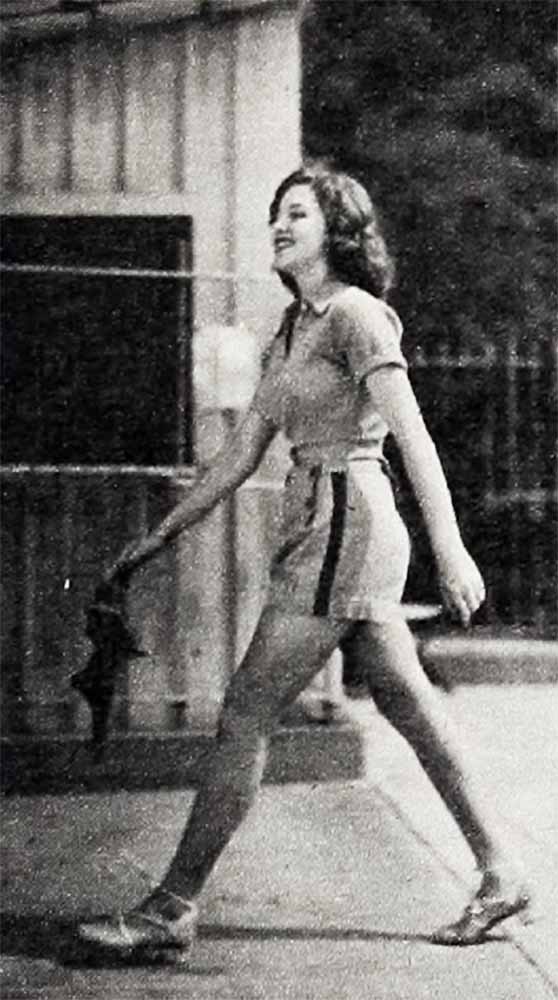
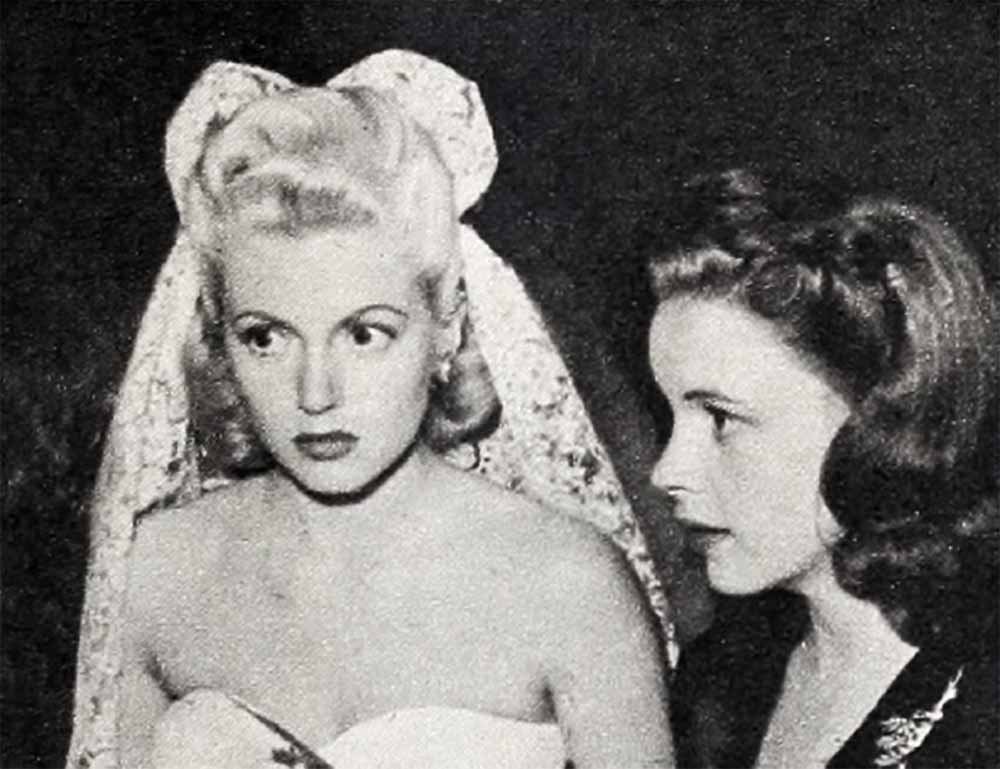
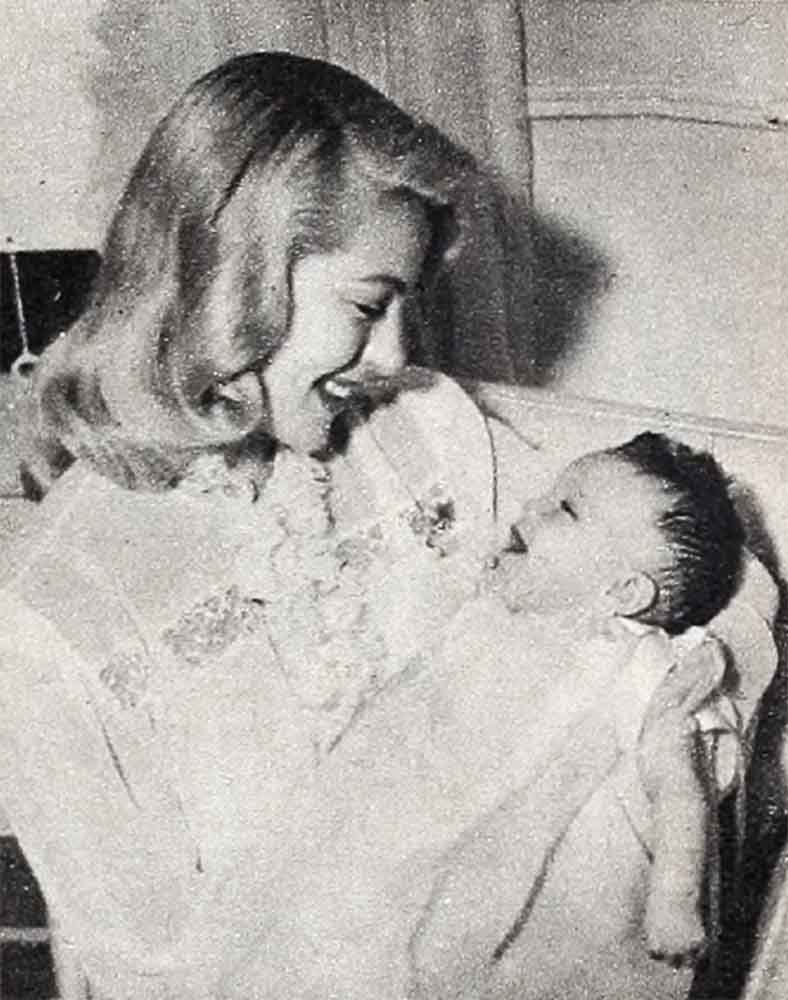
“She’s never been left alone” . . . No, Cheryl had not been left alone. She had been turned over to grandmother, or a nurse, or a governess, or an exclusive girls’ school whenever her mother was working, or getting married, or engaged with some current romance, or merely living it up at some pleasure resort. Could Lana honestly believe that her daughter had never been left alone? Could she think—had she ever thought—that the mere physical presence of someone to watch over Cheryl was enough to prevent the psychological ravages of loneliness in a young girl’s life?
And all the more appalling is the thought of a girl who, at fourteen, is kept under constant vigilance. What other normal teenage girl at that age could not be left to spend an evening alone at home? But then, what normal teenage girl would be subject to the threats and dangers of a wealthy movie star’s child?
Poor Cheryl. Poor little rich girl, spending her Easter vacation, dressed in a robe and slippers that cost any other girl a year’s clothing allowance, curled up in an expensive chair in an expensively furnished room in an expensive mansion (rented last Tuesday), watching her own TV set. Poor, lonely Cheryl.
How did she come there? To under stand that, you have to go back—far back—many years ago, to a little girl named Julia Jean Mildred Frances Turner.
She was born in Wallace, Idaho, on February 8, 1920. Her family history is vague, and lowly. Her mother, Mildred, was an ex-hairdresser. Her father, Virgil, was reputed—at least in the minds of fanciful press agents—to be a smalltime vaudevillian. Be that as it may, he was a man of wit and gaiety and his small daughter loved him dearly. And she, his only child, was the apple of his eye.
When Virgil Turner’s ne’er-do-well existence as an itinerant miner took him and his family to San Francisco, he prospered briefly. Then one pay day he stopped off, as was his wont, to increase the family fortunes in a hot crap game. The next morning, his body, with his coat pulled over the face, was found propped against a wall in an alley. His left shoe was missing. That was the shoe where he kept his pay.
Since the age of ten, his daughter has lived with that terrible memory of the one man she loved torn away from her forever in cruel violence. And the searing memories of the years that followed.
The day when her mother, struggling to make a living for them on a pittance as a hairdresser, took her to a family in Modesto who promised to give her a good home. The days of horror that followed, when she was forced to become a slavey to the household, scrubbing floors, preparing meals and washing clothes until she was ready to drop, beaten until she bled for the slightest mistake. “I was a Cinderella,” she said years later, “but without any hope of a magic pumpkin.”
Then, at last, her mother came, took one look at the welts on her body, and whisked her back to San Francisco. But it was only the beginning of another kind of hardship—spending long hours alone while her mother worked, for ten dollars a week, going for days without food because there was no money to buy it.
TURMOIL
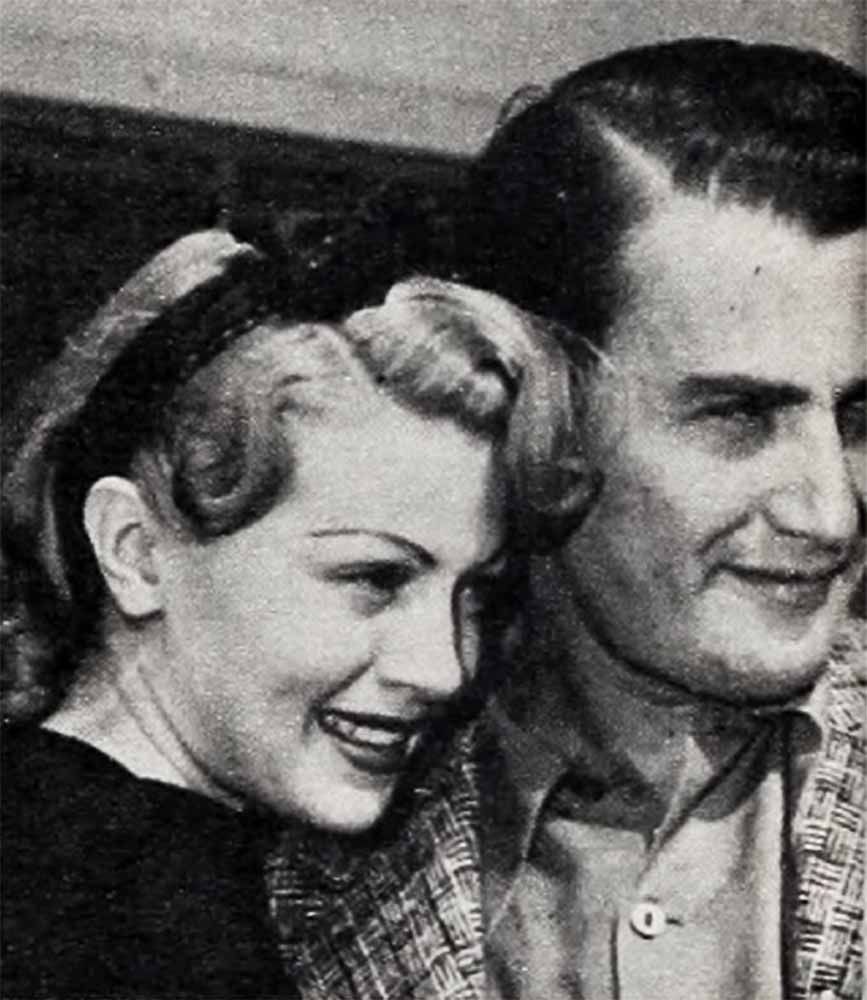
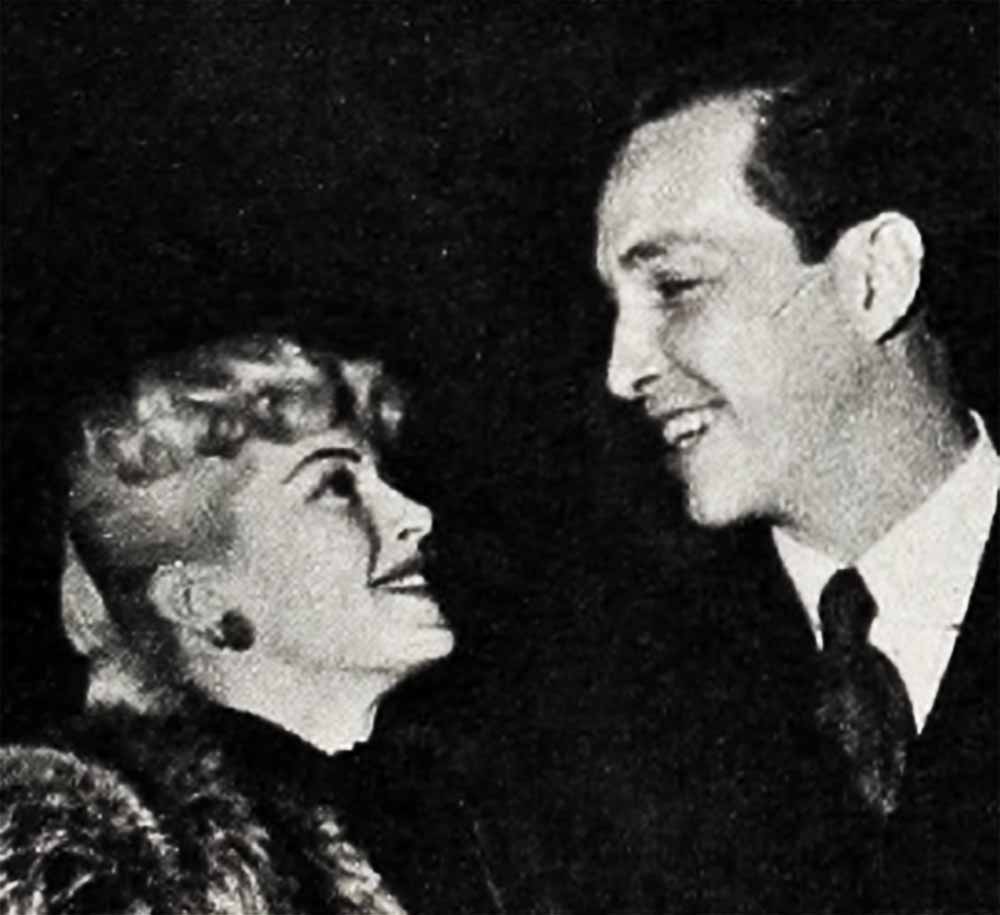
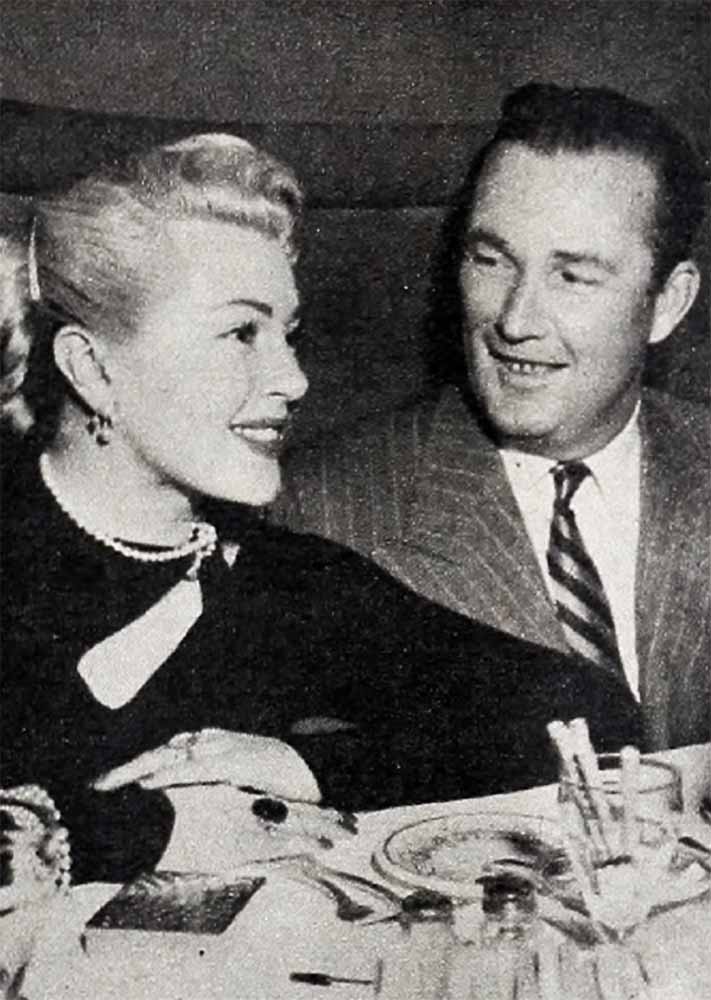
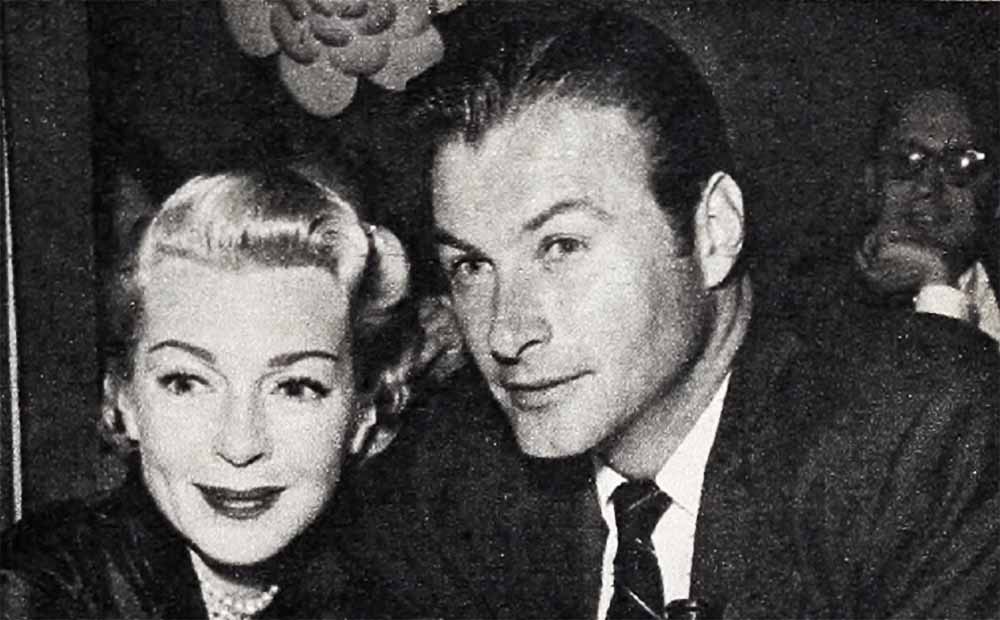
To her, the security of money, food, clothing was more than enough. The pleasant, commonplace companionship of anybody—any human being—a treat.
So that, when she had a daughter, and was able to give her all those things, she thought it was sufficient. Constant care by capable, kindly people, mink coats at the age of six, delicate, handmade dresses, birthday parties catered by the most famous restaurateurs, with a complete show of clowns and animals to entertain—Cheryl had them all. All the things her mother never had.
She was never left alone . . . what a picture of panic is here! The panic of a mother who, from the age of ten, had never forgotten the terror of loneliness.
But, she had never been able to escape from it. Why?
At some time after eight o’clock, John Stompanato returned to Lana Turner’s home . . . “Mr. Stompanato . . . was very, very violent, and I went upstairs, and he mas right behind me, and I walked into my daughter’s room, and she mas matching TV, and Mr. Stompanato mas behind me all the time . . . The threats weren’t then, but the language mas bad, smearing, and I turned to Mr. Stompanato . . . About that time I happened to glance at the TV and I remembered that it mas the Phil Silvers show, and I had. been out of the country for a number of months working and I had not seen TV, so I mas hoping that I would be able to match it for a moment . . .”
To think of watching a TV comedy show when a man, an outsider, has walked into her daughter’s room, using language not fit for her ears to hear! How could she?
She could, because, when she was only fifteen, she went to the unreal world of Hollywood—and from then on knew only that.
She had moved to Los Angeles with her mother just a few months earlier. Her mother had a lung condition, and hoped the climate would help. She went to Hollywood High, but she didn’t care for it much, and wasn’t a good student. Like most of the other youngsters, she was movie-crazy, and she often cut classes to see a show.
On one particular day, she cut an eleven o’clock typing class. She didn’t like typing. And she went to a drugstore opposite the school, at Highland and Sunset, and ordered a drink which has since gone down in history variously as a chocolate soda or a strawberry malt. Actually, it was a Coke, and, she later candidly confessed, “a cigarette.”
When the well-dressed man with the thin black mustache walked over and asked her, “Would you like to be in pictures?” she eyed him coldly. She knew that line. But it turned out that he was Billy Wilkerson, prominent publisher of a movie trade paper. He was on the level. And Lana was on her way to stardom. Wilkerson introduced her to agent Zeppo Marx, the businessman among the Marx Brothers, who took her to director Mervyn LeRoy. LeRoy was looking for a sexy, unknown teenager for a part in “They Won’t Forget.” He took one look at her and signed her to a personal contract. She chose the name Lana herself—“Nobody had ever heard of it, but I liked the sound.” Movie audiences took one look at her in the film, walking down a street in a clinging sweater, and never got over it.
TRAGEDY
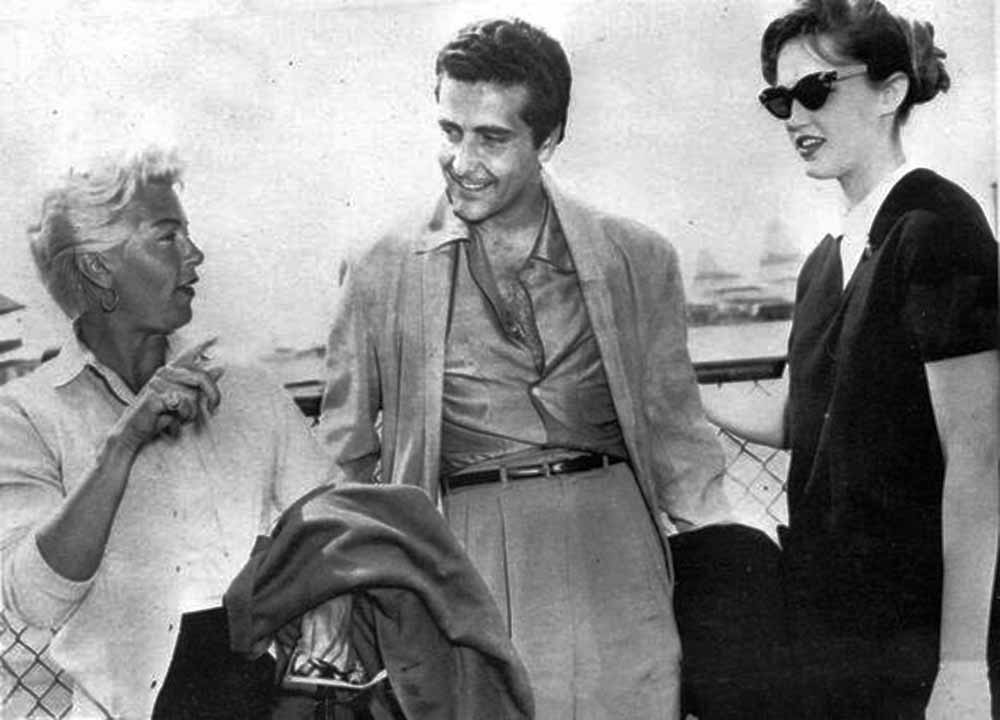
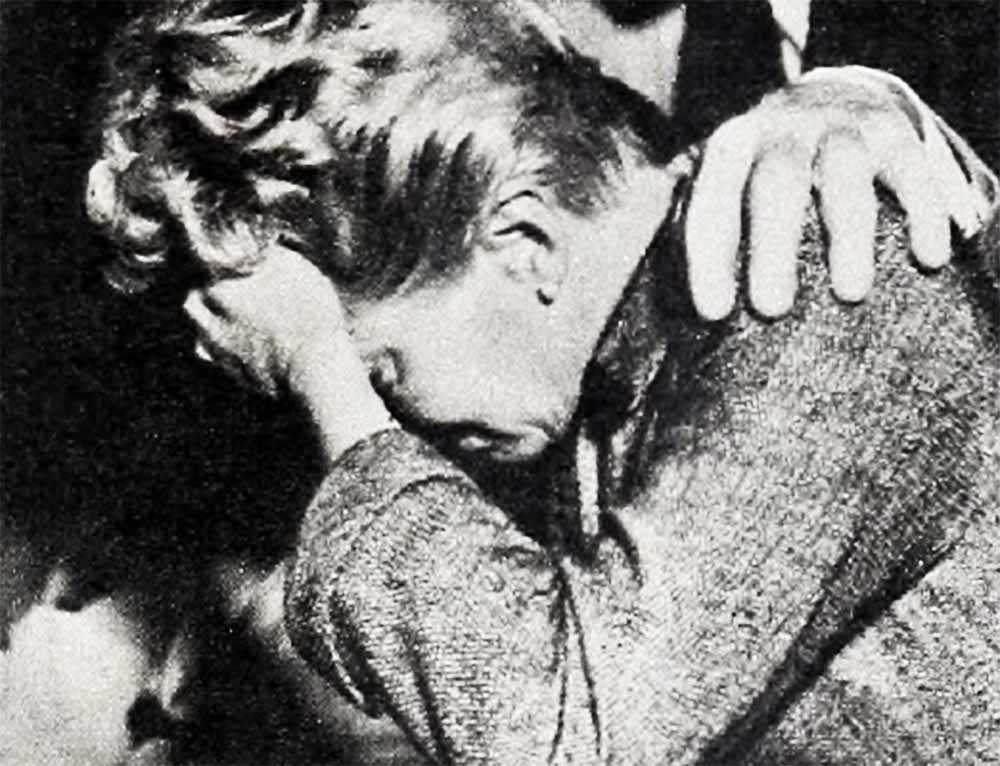

Neither did Lana. At the preview, when she heard the gasps, she cringed, and when the picture ended, fled from the theater without speaking to anyone. Ever after, she was overly self-conscious about her figure, and, Sweater Girl or not, avoided that knitted garment like the plague. In later years, she always stoutly maintained, “I don’t dress to please men, or women, either. I dress to please myself.”
Lana was plunged into the headlines of stardom, at an age when she was hardly more than a child. Greedily, heedlessly, as any uneducated girl from her drab background would, she grasped eagerly at all the things that had been denied her, like a child let loose in a candy shop—a swank apartment for her and her mother, a car, fire-engine red, furs, jewels, clothes, perfumes. She went nightclubbing every night with a different escort—dancing, laughing, clapping her hands in glee at the entertainers.
And all her life, these pleasures were to become for her the one real thing, the welcome escape from the confusion of being a sex Symbol that she did not understand, and the bewildering longings and loneliness that haunted her ever since her father was killed. And so, years later, she ran away from the ugliness of the scene with Stompanato with a foolish, feeble attempt to watch TV . . .
She went downstairs, and back upstairs to her bedroom while he followed, quarreling violently all the while. “All I kept saying mas, ‘There’s no use discussing it any further,’ that ‘I can’t go on like this, and I want you to leave me alone’ ”
Men, so many men, had come and gone in her life. Sometimes they left her, sometimes she spurned them, but always, they left. “Men are playthings to Lana Turner,” a critic once said. “Each man is like a new doll, to be tired of and discarded just as quickly.”
It wasn’t always true. It wasn’t true when, as a giddy starlet, she fell in love with mature, sophisticated lawyer Greg Bautzer. It was no secret that Lana wanted to marry him, but something went wrong. The same “Something” that was to plague her through all her men and all her marriages.
Pampered by a doting studio, she had already become a girl who got whatever she wanted, did whatever she wanted. Her mother soon lost what little discipline she had been able to wield over her reckless, headstrong daughter, who shrewdly realized that, no matter what hot water her escapades got her into, the studio would always rush to cover up and defend her. It was a matter of simple arithmetic—she was worth millions, and they had to protect their investment.
Nobody thought about protecting Lana from a power as dangerous as putting matches into the hands of a six-year-old. Nobody thought about the terrible price it would certainly cost her . . .
When Bautzer suggested certain concessions, such as giving up her career in favor of marriage, she turned a deaf ear. She could always have her cake and eat it, too. But she was badly hurt when Bautzer backed out.
On the rebound. she eloped to Las Vegas with Artie Shaw, for whom only a few weeks before she had expressed actual dislike, after a date during which he gave her a lengthy recital of his needs, his ears, his frustrations, and his longing for a home and the love of a good woman. Said nineteen-year-old Lana, “Let’s go.”
Artie gave her lectures on wifely deportment, thick books to improve her mind, and his dirty shirts to wash. Four months later, she was posing sweetly with Artie when a reporter asked if it was true that they were divorcing. “Yes,” said Lana suddenly. “We are.” With that, she disengaged Artie’s arms and sped away in her car—remembering to call him back to tell him about the suits at the cleaner’s and fixing the lock on the bathroom door. A typical Turner gesture. No matter how mixed-up her emotions, she can shove them aside and go about the details of working and living with well-ordered efficiency. This may be another form of escape from bigger problems, but her friends and doctors believe that it is a strength that has saved her from many a crackup—and may save her now.
After Artie, there was Tony Martin. Tommy Dorsey. Other musicians, other men, some famous, some not. For a while, it looked as if she was going to capture Howard Hughes. Lana thought so—even went so far as to have her linen embroidered with an “H” and prepare for a wedding. But Hughes suddenly found himself engaged in urgent business matters. And never came back.
“Welcome back,” said the judge in Las Vegas, when, out of the blue, she appeared to marry a young broker, Stephen Crane. She had known him for some time, but the wedding was a complete surprise.
Probably, in Crane, far less wealthy and famous than her other suitors, she saw security. What she got was anything but.
Shortly after they had settled down in Crane’s apartment, Lana announced jubilantly that she was expecting. Shortly after that, it developed that she was not legally married, because Mr. Crane, who had miscalculated, was still married to his former wife. Lana got an annulment. When Crane’s divorce became final, he begged her to remarry him. She refused. In despair, he tried to drive his car off a cliff, then took an overdose of sleeping tablets. A weeping Lana collapsed at his bedside and was hospitalized. Such was the start in life of little Cheryl Crane.
For the sake of the coming child, Lana and Steve remarried, but Lana divorced him four months after she was born, asking custody. Crane countered with a suit of his own, and a bitter custody fight followed, with Lana emerging the winner.
Turhan Bey (with whom Crane had a slugfest at a party over a ring he had given Lana) was next. Followed by many others. Then Tyrone Power. She threw a magnificent farewell party for Ty when he went to Europe—and into the arms of Linda Christian. It was a blow that hurt Lana much more than she ever pretended.
Off and on, between beaux and location trips, she smothered little Cheryl with attention and affection. She was conscientious about being a “good” mother—at least, as she could see it. But often as she said, “I’ll never marry again,” she could not stifle the hunger in her heart. The need, all-consuming, for the love she never had. And didn’t know how to give. She showered her man-of-the-moment with expensive gifts—gold cigarette lighters with endearing inscriptions, gold cuff links. But she never knew how to give of herself, because the appalling fact is that she never had a chance to learn what that kind of giving meant.
When she wed millionaire Henry J. (Bob) Topping in 1948, it was with a pathetic effort to have a “real” wedding and a “real” marriage. But the fabulous ceremony, complete with a cake and gallons of champagne and Cheryl as flower girl, was turned into a carnival, with crowds trampling the lawns.
She made two heart-breaking attempts to have a baby, although she has an RH blood factor that makes bearing children difficult and dangerous. A miscarriage of the first child almost cost her life. When the second was tragically lost after a fail down a flight of steps, her hopes were blasted. In 1952, she was divorced from Topping, left with only a mortgaged mansion.
In a feverish romance with fiery Fernando Lamas, she tried to forget, but it ended in a brawl at a Hollywood party— Fernando walking out on her and turning to Arlene Dahl; Lana turning to Arlene’s ex, Lex Barker.
They were married in Italy in 1953. Again, Lana tried to save the marriage by having a baby, but suffered a third miscarriage.
Through it all, little Cheryl was growing up fast. She had to. “My little Mommy,” she called Lana, protectively.
But inside, she was hurt and disturbed. “My mother and father fight all the time,” she confessed to Miguel Acosta, the kindly man who found her wandering in Skid Row a year ago because she “hated school” and turned her over to the police. Lana’s solution was another school for Cheryl—and a divorce from Lex.
“I think men are exciting,” Lana said recently. “The gal who denies that men are exciting is either a lady with no red corpuscles, or a saint.” Johnny Stompanato called her up. She found him exciting.
Friends warned her, but how could she listen? The men she loved had always left her; those she didn’t, she had left. Why would this be different?
It mas horribly different … “I was walking toward the bedroom door and he mas right behind me, and I opened it, and my daughter came in, and I smear it mas so fast I truthfully thought she had hit him in the stomach . . .”
For Johnny Stompanato, it ended near her bed, on a pink carpet.
For Cheryl, it ended with a verdict of justifiable homicide, and the protection of the court, which placed her in two months’ temporary custody of her grandmother, Mildred Turner.
For Lana, it has not ended. Her career was not damaged, apparently. Her first independent production for her own company, “Another Time, Another Place,” was immediately booked into 800 theaters, and will net her a fortune. Producers have stated that they would not hesitate to use her, and Jerry Wald is seeking her for “The Sound and The Fury.”
But—she, Cheryl and Steve Crane have been slapped with a $750,000 suit on behalf of Stompanato’s son. Johnny’s relatives charge that the whole story has not been told, and ask why, if Stompanato was struck in the stomach, he landed on his back?
She and her lawyer, Jerry Giesler, have received mysterious phone threats, alarming enough to call for twenty-four-hour police protection.
Worst of all is the fear that she will lose her daughter. Cheryl was reported to have told a psychiatrist, “I love both my parents, but I would prefer to live with my father,” as lawyers on both sides prepared for battle. But Karl Holt, director of the County Probation Dept. said, “She thought perhaps she would not be allowed to go back to her mother,” and that being in the middle had “upset her completely.”
No, Lana Turner’s troubles haven’t ended. They have just begun.
But is she guilty? Or is she the victim of a life she never sought? Here are the facts. Judge for yourself.
THE END
It is a quote. PHOTOPLAY MAGAZINE JULY 1958




